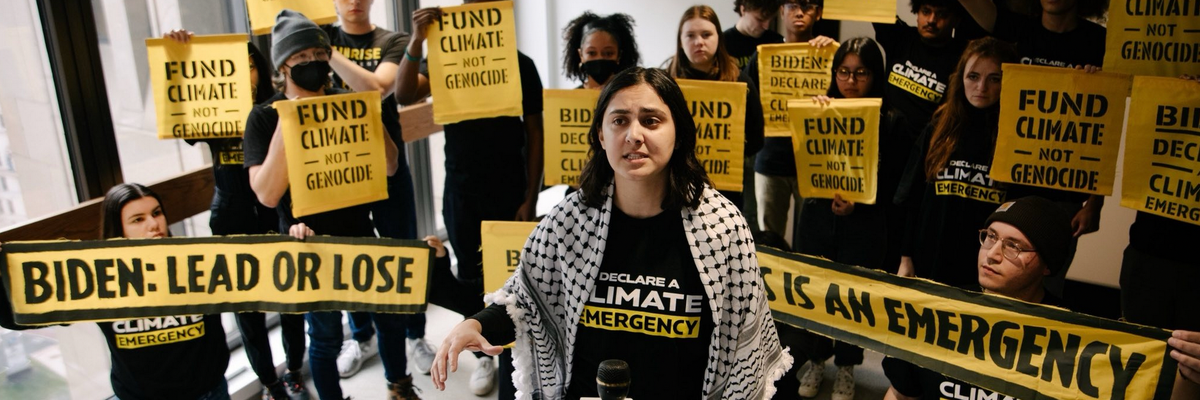Climate campaigners this week rebuked recent claims by U.S. President Joe Biden—and Vice President Kamala Harris, the 2024 Democratic presidential nominee—that the United States can simultaneously increase fossil fuel production and transition to a clean energy future.
On Saturday, Biden
boasted on social media that "on my watch, we've responsibly increased our oil production to meet our immediate needs—without delaying or deferring our transition to clean energy."
"We're America," the president added. "We can do both."
In a simultaneous swipe at the Biden administration's climate record and support for Israel's annihilation of Gaza, the direct action group Climate Defiance
retorted: "No you cannot 'do both.' That would be like sending 50,000 tons of lethal weapons to a brutal, murderous regime and then telling them you 'want a cease-fire.'"
Other climate groups and experts have also challenged Biden's position in recent days.
Climate scientist Peter Kalmus
said on social media, "This is horrifying."
Fridays for Future USA
contended, "You cannot in fact do both."
"You can't expand fossil fuels on Monday, expand renewables on Tuesday, and call it climate action on Wednesday," the youth-led movement added. "Do better."
Noting that Harris has also claimed that "we can do both," author and professor Genevieve Guenther
asserted: "'We can do both' is apparently the climate and energy messaging on which the Harris campaign has settled. (Harris used the identical phrase in her CNN interview.) I understand it as a message that meets the moment. But it's not true, and I hope they don't believe it."
Despite lofty rhetoric and campaign pledges to center climate action—including by stopping new fossil fuel drilling on public lands—Biden
oversaw the approval of more new permits for drilling on public land during his first two years in office than former President Donald Trump, the 2024 Republican nominee, did in 2017 and 2018.
The Biden administration has also
held fossil fuel lease sales in the Gulf of Mexico and has approved the highly controversial Willow project, Mountain Valley Pipeline, and increased liquefied natural gas production and export before pausing LNG exports earlier this year.
Despite the pause—which campaigners are
urging the Biden administration to make permanent—the president has also overseen what climate defenders have called a "staggering" LNG expansion, including Venture Global's Calcasieu Pass 2 export terminal in Cameron Parish, Louisiana and more than a dozen other projects that, if all completed, would make U.S. exported LNG emissions higher than the European Union's combined greenhouse gas footprint.
Biden also
drew ridicule last year after he said he has "practically" declared a climate emergency—a longtime demand of activists. The president's claim came during a speech touting the clean energy provisions of the Inflation Reduction Act, which allocates hundreds of billions of dollars for climate-mitigating investments but also includes policies that anger green groups.
Climate campaigners widely agree that a Harris administration would be far preferable to one led by the climate science-denying Trump, one of whose mottos is "Drill, Baby, Drill." During his first term, Trump rolled back numerous climate-focused regulations and aggressively expanded U.S. fossil fuel production. Biden has reversed some of Trump's most impactful attacks on climate and environmental protections.
In April, Trump
reportedly told fossil fuel executives that a $1 billion investment in his campaign would be a great deal for them due to all the taxes and regulations they would avoid under his administration.
Meanwhile, Harris is
widely expected to continue many of Biden's climate and energy policies, including embracing fracked methane gas, which she once said she wanted to ban.
In another "we can do both" moment, Harris told CNN last week that "what I have seen is that we can grow and we can increase a thriving clean energy economy without banning fracking."




